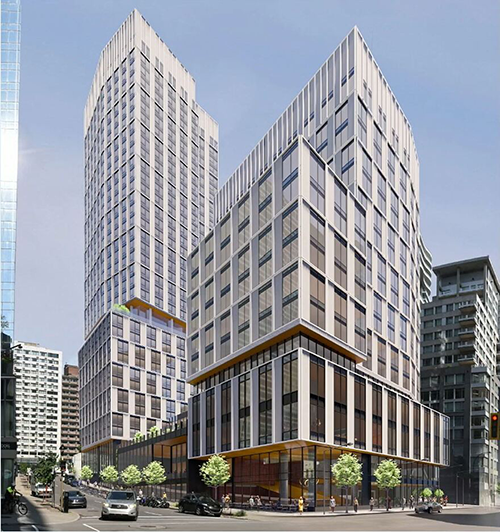One is a former commercial office building in downtown Montreal, judged too complex to convert into residential. The other is a 23-storey tower in the heart of a redeveloped Radio-Canada plaza now slated to be repurposed. Each represents the push-and-pull of today’s urban redevelopment.
The first building, at 625 René-Lévesque Blvd. W., has been described as a brutalist concrete office tower, in reference to the architectural style of exposed concrete and minimalist form popularized in the 1950s and ‘60s. Developer Groupe Mach wishes to demolish the structure and construct a sparkling new 24-storey, 200-unit residential project that could be finished by 2028.
Although the building is located in a heritage protection area, the Ville-Marie borough’s urban planning advisory committee conceded this past March that the building held little architectural or historical interest. It also agreed with Groupe Mach that conversion to residential would be complex and expensive.
Robert Beaudry, a member of Ville-Marie’s urban planning advisory committee, told local media conversion of existing buildings into residential projects has its limits.

“To the extent that we want to deliver housing, there are certainly some concessions that we may have to make. But this is studied on a case-by-case basis, taking into account factors related to heritage preservation and the ecological transition.”
Replacement would be more than a visual improvement. Over time, he suggested buildings like 625 René-Lévesque Blvd. W. risk becoming vacant and falling into disrepair, benefitting neither the downtown area nor those who live and work there.
As outlined in Ville-Marie’s urban planning documents, the façade of the new building would have a pattern “emphasized by metal framing that runs upwards for several floors. The proposed design using stone and metal is vertical and contemporary in appearance and expression, and is complementary with buildings in the area.”
In addition, there would be, “green vegetated areas at the third and 23rd levels, with possibly more to come,” the document continues, plus two levels of underground parking and 63 bicycle racks at street level.
However, there are objections to a full scale demolition on the basis that it violates the principle of sustainability, is wasteful and simply represents an easy way out for developers. One such critic of demolition is Dinu Bumbaru, director of policy at the private non-profit group Héritage Montréal.
“Demolishing such buildings to build new ones is not consistent with the fine rhetoric about ecological transition,” he told LaPresse. “In France, such situations have led to calls for a moratorium on all demolitions to force the real estate and urban sectors to use their brains to adapt and redevelop existing buildings.”
In fact, one only needs to look 2.6 kilometres away for an example of repurposing — Radio-Canada’s 100-metre-tall, hexagonal office tower that opened in 1973.
The structure will be refurbished and become a focal point within a redevelopment called Le Quartier des Lumières, a former industrial area east of downtown Montréal near the St. Lawrence.
Interestingly, Groupe Mach is behind this project as well, along with Groupe Devimco.
“We’re going to strip the tower completely,” Daniel Arbour, vice-president of Groupe Mach, told LaPresse. “The only thing we’re keeping is the structure, which was built to withstand World War III, and we’re going to re-dress it with the same architectural language.”
This may involve a paler façade than the current dark brown. An exact decision will be made before work begins in 2027.
“Le Quartier des Lumières promises to become a unique living environment fostering a sense of inclusion,” the Groupe Mach website says. “It will include more than 2,500 residential units, including 481 social housing units and 245 affordable housing units.”
The 4.5-million-square-foot development will also include conventional business offices, studios and collaborative workspaces, specialized spaces such as clinics, day cares, art galleries, retail stores, restaurants and bars. And while there is some demolition involved, several important elements will remain, such as a large public square and a 24-classroom elementary school. The entire district is aiming for LEED-ND Platinum certification.
John Bleasby is a freelance writer. Send comments and Climate and Construction column ideas to editor@dailycommercialnews.com.








Recent Comments